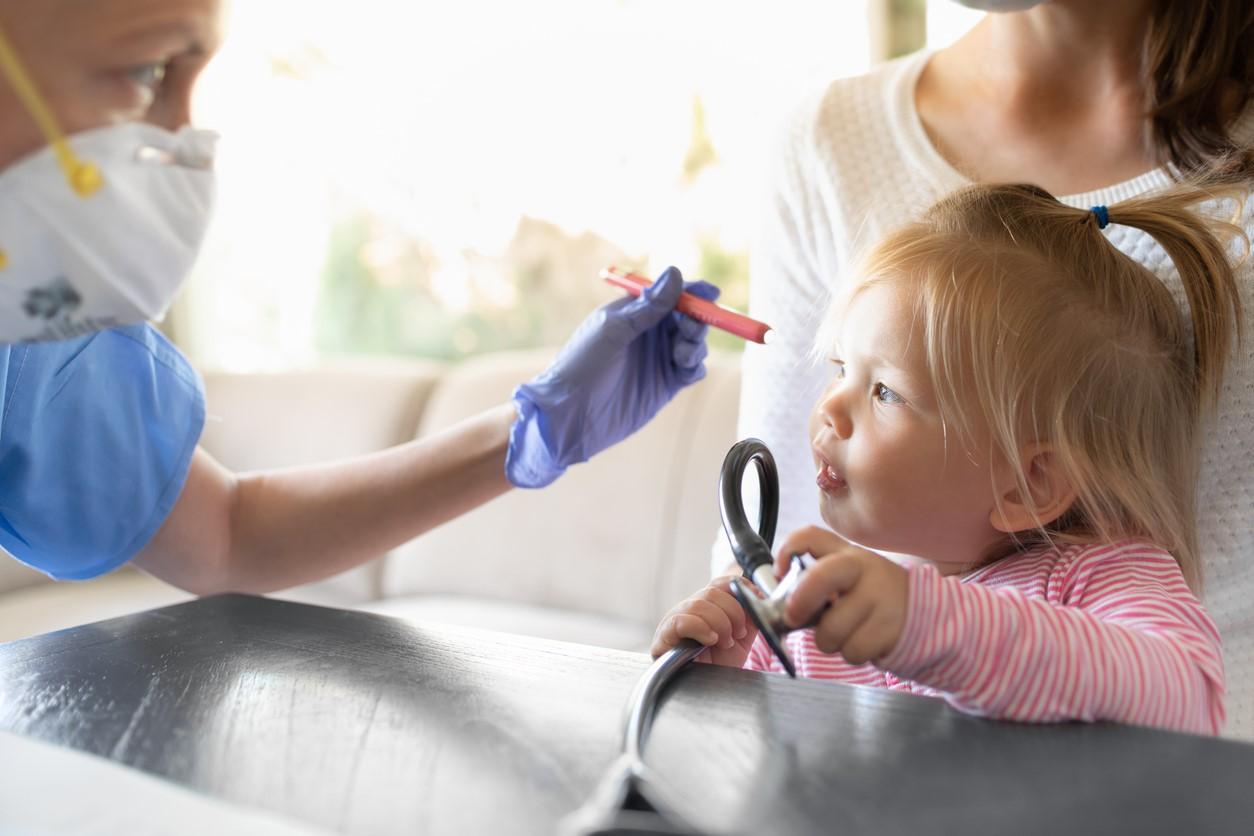Infants born to mothers infected with SARS-CoV-2 during pregnancy were more likely to receive a neurodevelopmental diagnosis by 1 year of age, regardless of whether they were born pre-term, according to preliminary findings of a Massachusetts General Hospital study published yesterday in JAMA Network Open.
The study included all 7,772 live births at one of six Massachusetts hospitals in two health systems from March to September 2020—before the emergence of the Delta and Omicron variants.
Almost all (96%) of the 7,466 pregnancies were singletons, and 222 infants (2.9%) were born to COVID-19–infected mothers. Average maternal age was 32.9 years, and the infants were Asian (9.9%), Black (8.4%), White (69.0%), or Hispanic (15.1%).
Doubled rate of neurodevelopmental delays
Fourteen of 222 (6.3%) of the infants exposed to SARS-CoV-2 in utero were diagnosed as having a neurodevelopmental abnormality, such as delayed speech, language, or motor function, compared with 227 of 7,550 (3.0%) of unexposed infants
Infants whose mothers tested positive for COVID-19 during pregnancy were more likely than those born to uninfected mothers to be given a neurodevelopmental diagnosis in their first year of life in both unadjusted models (odds ratio [OR], 2.17; 95% confidence interval [CI], 1.24 to 3.79) and after adjustment for race, ethnicity, insurance status, infant sex, maternal age, and preterm status (adjusted OR, 1.86; 95% CI, 1.03 to 3.36).
This link was even more evident when infection occurred in the third trimester (adjusted OR, 2.34; 95% CI, 1.23 to 4.44).
After accounting for non-singleton deliveries, the OR for any neurodevelopmental diagnosis among infants exposed to SARS-CoV-2 in utero was 1.86 (95% CI, 1.03 to 3.36). A sensitivity analysis assessing the contribution of preterm birth only, the adjusted OR was 1.97 (95% CI, 1.10 to 3.50).
In an analysis limited to full-term pregnancies (6,896 unexposed, 190 exposed infants), the OR for a neurodevelopmental delay was 1.68 (95% CI, 0.81 to 3.45). Among 27 diagnostic categories included in adjusted models, only viral infection of any type, which could include SARS-CoV-2, was significantly more common in infants of infected mothers (crude OR, 2.59 [95% CI, 1.76-3.81]; adjusted OR, 1.81 [95% CI, 1.20 to 2.72]).
Babies exposed in utero were more likely than others to be preterm (14.4% vs 8.7%). Infected mothers were significantly less likely to be Asian (3.2% infected vs 10.1% uninfected) or White (36.9% vs 69.9%) but much more likely to be Hispanic (51.8% vs 13.5%) and to have public than private health insurance (60.4% vs 17.2%). Rates of diabetes and high blood pressure were comparable between the infected and uninfected groups.
Link not definitive
The study authors cautioned that larger follow-up studies on the potential link between infected mothers and infant neurodevelopmental delays are needed. "Whether a definitive connection exists between prenatal SARS-CoV-2 exposure and adverse neurodevelopment in offspring is not yet known, in part because children born to women infected in the first wave of the pandemic are younger than 2 years of age," they wrote.
"More broadly, our analysis indicates the feasibility of leveraging EHR data for a retrospective cohort study that may enable detection of risk signals before such large-scale, prospective follow-up studies are available," they added.
In a related commentary, Torri Metz, MD, of University of Utah Health, asks whether the observed neurodevelopmental complications are being caused by exposure to the pandemic or by maternal COVID-19 infection. "Is it the virus itself or all of the societal changes that occurred during this period including differences in how those changes were experienced among those with and without SARS-CoV-2?" she wrote.
Metz also pointed out that the study included only infants exposed to early variants of SARS-CoV-2 rather than a potentially more severe variant such as Delta, because they are the only children now old enough to undergo complex neurodevelopmental assessments.
"Outcomes may be different by variant of maternal SARS-CoV-2 infection," she wrote. "Importantly, we also have no data on whether prior vaccination will have a protective effect against adverse neurodevelopmental outcomes for the offspring of mothers with SARS-CoV-2 beyond the direct benefit of persistent antibodies in the cord blood and through infancy."
But the most important question, Metz said, is how to intervene to help mitigate the pandemic's negative effects on young children. "Prospective studies to validate these findings, tease out some of the nuance, and identify those at highest risk will help health care practitioners appropriately dedicate resources to improve outcomes as we follow the life course of this generation of children born during the COVID-19 pandemic," she concluded.






















